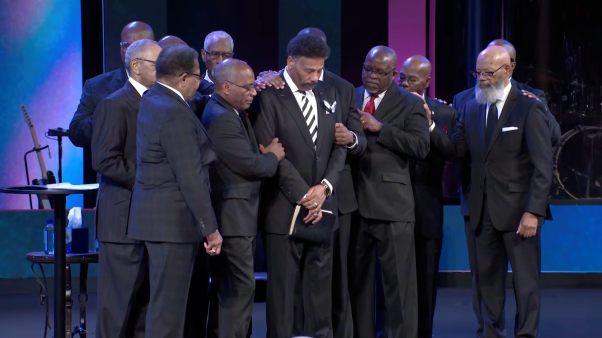Iam a man and count nothing human as indifferent to me, said the ancient Roman playwright Terrence. What do I as a man assert myself to be? For the Christian, what is man under God? The widely varying answers to these questions are strongly influenced by three major Western traditions.
First, systems of Idealism maintain that the universe is pervaded by mind or is ultimately of the nature of mind. Modern Idealism can no longer (except as expressed in cults like Christian Science) denigrate the physical world and the body. It is notable, however, that theology of the idealistic type, like that of Heidegger and Tillich, questions the ultimate value of personality. It is viewed as ephemeral, or as part of a higher reality, or as a means to some higher end. However, non-personal or supra-personal language, such as the assertion that God is the Ground of our Being, is neither higher nor more meaningful than personal language. It is simply impersonal anthropomorphic language. The idealist’s stress on spirit and value should not blind us to his rejection of the personal God and of the ultimate value of created persons, who, Scripture tells us, can enjoy personal knowledge of the Father and the Son (John 17:20–26).
More important has been Naturalism’s shaping of modern man’s view of himself. Behaviorists claim that everything about anything can be accounted for on the horizontal plane by natural processes, and that only this approach can provide an acceptable view of man in the scientific age. They have pressed the scientific method into defending the questionable premise that stimulus and response can adequately account for all human activity and human nature. Humanists like Arthur Koestler and J. Bronowski protest this reduction of humanity to the conditioned response. They claim that as creative agent man in all his activities shows himself to be more than a causally determined creature.
The critical point for modern man is whether personality involves for essential human nature more than our discussing the function and dissolution of the body.
Third, as based upon the biblical revelation, the Christian doctrine of creation implies that ultimate reality is of the nature of personal life and personal relations (Gen. 1:26). There is an important relation between the Christian doctrine of creation and the Christian view of personality. Neither the personal life of God nor the personal lives of human beings are transient modes in which a more real and enduring system of psychological patterns expresses itself.
From texts like Genesis 1–2; Psalm 8, and Psalm 139:13–16 we learn that man is the goal of the divine creative activity and the center of God’s interest. A noteworthy duality appears in the biblical teaching: (a) Man is aware of his biological origin; he is fashioned from the dust of the earth (Gen. 2:7; 3:19; Job 34:15; Ps. 103:14; Eccl. 12:7). (b) Man is also made aware of his uniqueness in relation to God his maker within the context of the biblical revelation (Rom. 1:19–23); he is fashioned in the image of God (Gen. 1:26, 27; 2:7).
Given man’s divine origin, what is his nature? General agreement exists among theologians on the meaning of biblical terms. The Hebrew term nephesh denotes chiefly “life-principle” of the body (Lev. 17:14). In the case of man it also signifies self-conscious life or a living personal being (Gen. 2:7; cf. Job 16:4; Isa. 1:14). Ruach is used for spirit or breath of life (Gen. 6:17; 7:15) and embraces the entire range of human and divine powers. Corresponding terms in Greek are psyche (soul) and pneuma (spirit), though argument continues on whether these are synonyms or two distinguishable yet vitally related aspects of the person. Basar in Hebrew and sarx in Greek identify the flesh. The body and its parts are instruments of the self, denoted by the Hebrew and Greek pronouns ’ni, ’noki, and ego. Spirit as a constituent element of personality occurs in Job 32:8; First Samuel 16:14 and Psalm 104:4. In both Testaments the heart is the center of self-conscious life and psychical activity (cf. Ps. 51; Rom. 1:9, 10) and is equivalent to the mind or self. Man’s uniqueness centers in his being created in the image (selem) and likeness (demuth) of God. Thus seen, man is a self-conscious spiritual reality.
From the biblical data we infer two points. First, each man is a personal being who enjoys a self-conscious existence and can act with purpose. He is a thinking, feeling, willing creature. We cannot define man either by attributing to him an undifferentiated unity or by reducing the distinctions within his nature to one or another of them; but neither dare we consider these distinctions as divisions of his nature. Second, the spiritual reality of the self implies a psychical realm that transcends the physical realm and includes God and spirits. (A parallel view is seen in the duality of mind and brain that some recent neurological opinion allows.)
God is Creater of both body and mind and has sanctified both. The doctrine of the resurrection shows the value Christian faith places on the body. The doctrine of the Christian life confirms this, for the physical life of man is the material out of which the spiritual life in Christ is built.
It may be helpful to consider a fourfold way of understanding human nature: Man is a self, an intelligent self, a valuing self, and a purposing self.
Man Is A Self
I take the self to be a non-reducible reality that we intuitively know ourselves and other selves to be. A person is not simply a unity of conscious experiences; he is the subject of that unity. This the pronoun “I” expresses as a commonplace of language.
Scientific study of the human brain tempts some to reduce mind to functions of the brain and the person to functions of the body. Neurologists have shown that, physiologically, thinking is based upon the patterned transfer of electro-chemical energy in the cerebral cortex and other related regions of the brain.
From his description of the physiological process, Lord Walter Russell Brain has concluded that the only necessary condition for the awareness of sense-data is a physio-chemical event in the cerebral cortex, and that “mind is the function by which the living organism reacts to its environment” (Science and Man). He is hopeful that new knowledge will be able to explain mental activity in terms of physics and chemistry.
Contemporary neurological descriptions of perception and thinking do not point to any single viewpoint. More important, however, neither in language nor in the results of their research do scientists and philosophers seem able to escape the problem of the mystery of human selfhood.
Several observations are pertinent: First, the self intrudes into language patterns, not simply out of habit, but because it is impossible to speak without disclosing the reality of one’s personality. Lord Brain can say, “What I have been giving you is a scientific account of what goes on in the nervous system when we see something” (Science and Man; italics mine). The intrusion is not simply verbal but logical; indeed, the sense would vanish without the reality of the self. A. J. Ayer, who is a destructive critic of Christian faith, and who makes the personal subject literally identical with that to which we also attribute physical properties, nevertheless almost wonderingly concedes that the only way to describe this subject that unifies things separated in time is to call it a person. He adds, “These particular experiences can then be identified as the experiences of the person whose body it is” (The Concept of the Person; italics mine).
Second, the term “subject” is sometimes used in more than one way. For example, when Lord Brain speaks of the “cerebral cortex of the subject,” by “subject” he means the creature of scientific study; but when he says “perceived by the subject,” he means perceived by the conscious person or discrete personal reality. A seldom noticed comment of his is apropos: Personality comprises a pattern like other energy patterns in nature, but in some mysterious way it possesses a life of its own.
Artificial electric stimulation of certain cortical areas, which produces experiences of the appropriate sense-data and motor responses, has been said to show that mind and personality can be accounted for solely on the basis of electro-chemical discharges in the brain. However, Wilder Penfield, neurosurgeon in Montreal, has gathered important qualifying data. While it is true that the surgeon can stimulate arm movement, during an experiment Penfield’s patient remarked, “I didn’t do it. You made me do it.” The patient attempted to hold his moving hand with his other hand. Thus behind the two brain hemispheres were two controls: the electrode and the patient’s mind.
Intelligent Self
Rationalism is obviously not the basis of the biblical revelation, but this must not obscure the truth that the biblical message is everywhere a rational appeal to intelligent beings who are capable of grasping its message. Such is the biblical indictment of idolatry (1 Ki. 18:27; Isa. 44:14–20). Important parallel appeals to understanding occur commonly in Scripture (Prov. 1:2–5; Isa. 1:3; Luke 5:23; 12:56, 57; Acts 24:25; Heb. 3:4). Paul’s attack upon the wisdom of the world (1 Cor. 1–2) is in no sense an attack upon intelligence; its subject is the abuse of reason.
Behaviorists vigorously oppose philosophical rationalism, but this attitude spills over into a denigration of intelligence that is expressed in highly rationalistic ways. Nevertheless, most naturalists hold to the primary role of intelligence for man’s life today and in the future, and thereby concede a creative role to mind and will.
Since intelligence is the power of rational thought, all our definitions of it are inevitably circular. Also, we are becoming increasingly aware of how complicated the thinking process is. Intelligence is not solely cold deductive reasoning but a highly fluid and imaginative activity. Insights often occur like flashes, or breakthroughs of habitual forms of thought. Creative imagination is not flight into fantasy but rationally guided exploration.
To speak of intelligence as man’s crown does not deify reason. As a thinking being, man is concerned not only with the power of rational thought, or with new discovery, but also with morally controlled insights into how to use what he discovers. Scientific progress depends upon moral commitment to truth. Social progress depends upon moral commitment to righteousness.
Moral Self
Today man is viewed ethologically in terms of mores, not morals. But a condition of personal life is awareness of the difference between right and wrong and some commitment to righteousness. There is a moral basis to life beyond mores (Rom. 1:18, 19).
Modern man has lost faith in God partly because he has lost faith in conscience. We have learned how to manipulate conscience by conditioning, but we have lost sight of the truth that the ultimate sanction for conduct is a righteousness unto the Lord. If all standards of conduct are relative, can anything anyone ever does be wrong? Is justice, as Thrasymachus said, the interest of the stronger? Is a society conceivable in which it is always better to do wrong than right? Can we not draw a moral inference from such ostensibly a-moral modern language as “a-social” or “anti-social,” which often really mean “wrong”? If intelligence and valuation are simply tools for satisfying creaturely needs, can love and altruistic behavior ever arise?
No modern redefinition of “good” and “evil” can take away the fundamental realities they stand for. A sense of right and wrong is indispensable to being human and to maintaining order in society. The moral law, without which human spiritual life is impossible, is God’s law, not man’s (Rom. 3:19, 20; 7:7–12).
Purposing Self
As an individual personal reality, man is capable of conscious, free, purposeful action. This action makes use of both the dependability and the contingency we observe in the world order. Man’s actions register the use of qualified freedom, but for the Christian they point to perfect freedom when man’s acts will be under the control of a redeemed intelligence that is morally and spiritually oriented (John 8:34–36; Heb. 10:7).
In his novel Walden Two, B. F. Skinner develops the theme of a behaviorist utopia. The mythical community, set in the American Northeast, furnishes for its inhabitants a completely controlled environment. Thoughts, habits, needs—everything is determined and provided for them. Individual initiative is regarded as harmful. Skinner looks forward to the creation of a society where the idea of freedom will be only a bad dream. He aims to control and predict all human behavior just as we concontrol and predict natural phenomena.
But do not all sane men assume that they can control or modify their actions by choosing to do so? We have, as Percy W. Bridgman says, “a feeling in our bones that we know what we are doing.” “We disregard determinism when dealing with ourselves; we have to disregard it also, within reason, in our everyday contacts with our fellows (The Way Things Are). Personal life spiritually qualified has the capacity for purposeful, creative activity, which goes beyond sheer intellectual brilliance to include a feeling for fife.
To spiritual men, the world becomes increasingly transparent. In our Lord’s fife we note his conscious purpose, to do the Father’s will: “Neither came I of myself, but he sent me” (John 8:42; 7:28, 29). This purpose issued from an inner core of righteousness, where knowledge of the will of God and positive response to that will united: “My meat is to do the will of him that sent me, and to finish his work” (John 4:34). Our thoroughly and thus mystify and impress the committee. Use this word frequently.
Dialogue. Another must word. Anyone who does not use it often is openly admitting a fondness for mere monologue. Two Greek words originally made it up, but all that etymological business is out. Today it generally seems to mean two or more people voicing opinions about things that none of them understands, exploring vague concepts and confusing words, and then going away feeling they have really come to grips with the issues. For variation, try “dialogical involvement” or “dialogical listening.”
Renewal. You must say a lot about the “renewal of the Church” if you are going to make any headway in ecclesiastical circles today. Other generations talked about “revival,” but that word is out; be sure not to use it. The two words are similar, except that “revival” demanded some personal change and “renewal” does not. “Renewal” generally means changing the things in the life of the Church that I do not like in the way I think they should be changed.
Institutional Church. This is what always needs renewing. The term refers to the “they” in the life of the church, those people way over there or way up there who somehow run things without asking the rest of us.
Grass Roots. This very useful term contrasts with “institutional church.” It refers to that place or position where I am now, which no one but those who agree with me can possibly understand.
Involvement and Concern. When you have nothing to say you can bring the committee to attention with a firm assertion that “what we really need is concern,” or “there is a great need today for honest involvement.” No one can disagree. Use these words so as to imply that you yourself are already “concerned” or “involved.” Those on the other side of the question will quickly understand that they are not: this is a good beginning toward building at least a hump on the camel.
Ecumenical and Ecumenism. (Be sure to pronounce the latter word to rhyme with “humanism.” Practice saying it before the committee meets so that it will roll off your tongue as though you used it many times each day.) These words have many meanings, but generally they refer to anything that has to do with all the other churches; this takes away the need for local action or immediate responsibility. These are highly pragmatic terms.
Existential. This has to do, simply enough, with the philosophy of the importance of existing right now without worrying about the future or the past. Now the philosophers who talked about the “existential moment” may have had a little more in mind than this, but who understands existential philosophy? Since no one really reads Kierkegaard, you are on perfectly safe ground in using this impressive word.
Relevant. Everyone needs to be “relevant.” What this means is being interested only in things that are important. These are the things that are relevant. You can easily imply that the other person’s ideas are simply not; indeed, you can bat down all sorts of things by calling them “not relevant” in a committee meeting.
Awareness. Others gain “awareness” when they finally see things as I see them; if they don’t, then they simply cannot “relate” (another very useful word).
In Depth. At some point suggest that the committee turn to studying the matter “in depth.” This implies that all that has been said up until then is quite shallow, and that what you are about to say has about it the wisdom of Solomon.
Theologize. This is the religious equivalent of philosophize. It simply means to talk about religious things in a pleasant and theoretical way. It is quite all right to be irrelevant as long as you call your irrelevancy “theologizing.”
Affluent. Use “we” with this word to show that you are part of the group. We who are affluent should, as a group, do a little for the others to show them that we are aware that they do not have as much as we do.
Authentic Person. Use this phrase to imply that you are one, and that anyone who questions you is not. This is in a way the old “emperor’s clothes” technique, in that you suggest that all who do not see the point, or who disagree, are really not worthy of their office, or of a place on the committee, and are not authentic persons.
There is one alternative to all this. That is the very drastic one of allowing Jesus Christ to possess our hearts and lives in such a way that we will be his own and he will be the Lord of life. From such a revolutionary basis as this, we can then attack the problems of our age. But who wants to try such a radical step? It would involve dialogue with God, and who really listens to him? He isn’t even on the committee.—JACK and KARIN RAMSAY, Covenant Presbyterian Church, Carrollton, Texas.










